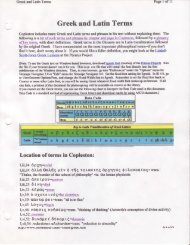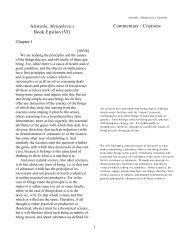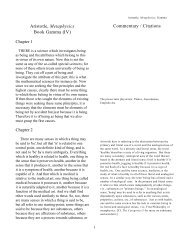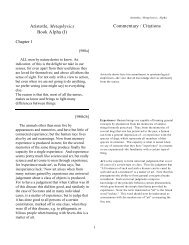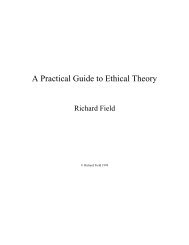Aristotle, Metaphysics Book Zeta (VII) Commentary ... - CATpages
Aristotle, Metaphysics Book Zeta (VII) Commentary ... - CATpages
Aristotle, Metaphysics Book Zeta (VII) Commentary ... - CATpages
You also want an ePaper? Increase the reach of your titles
YUMPU automatically turns print PDFs into web optimized ePapers that Google loves.
<strong>Aristotle</strong>, <strong>Metaphysics</strong>, <strong>Zeta</strong><br />
horse there will belong a second essence. Yet<br />
why should not some things be their essences<br />
from the start, since essence is substance? But<br />
indeed not only are a thing and its essence one,<br />
but the formula of them is also the same, as is<br />
clear even from what has been said; for it is not<br />
by accident that the essence of one, and the one,<br />
are one. Further, if they are to be different, the<br />
process will go on to infinity; for we shall have<br />
(1) the essence of one, and (2) the one, so that to<br />
terms of the former kind the same argument will<br />
be applicable.<br />
Clearly, then, each primary and self-subsistent<br />
thing is one and the same as its essence. The<br />
sophistical objections to this position, and the<br />
question whether Socrates and to be Socrates are<br />
the same thing, are obviously answered by the<br />
same solution; for there is no difference either in<br />
the standpoint from which the question would be<br />
asked, or in that from which one could answer it<br />
successfully. We have explained, then, in what<br />
sense each thing is the same as its essence and in<br />
what sense it is not.<br />
This chap ter establishes the view that a substance is<br />
identical with its essence. An imp ortant implication of this<br />
for <strong>Aristotle</strong> is that a substance exists as what it is because<br />
of its essence. It is because of his humanity that Socrates<br />
exists, and thus the view that Socrates could survive his<br />
humanity (as something else--a dog, a spirit) is absurd.<br />
Chapter 7<br />
Of things that come to be, some come to be<br />
by nature, some by art, some spontaneously.<br />
Now everything that comes to becomes to be by<br />
the agency of something and from something and<br />
comes to be something. And the something<br />
which I say it comes to be may be found in any<br />
category; it may come to be either a 'this' or of<br />
some size or of some quality or somewhere.<br />
Now natural comings to be are the comings to<br />
be of those things which come to be by nature;<br />
and that out of which they come to be is what we<br />
call matter; and that by which they come to be is<br />
something which exists naturally; and the<br />
something which they come to be is a man or a<br />
plant or one of the things of this kind, which we<br />
say are substances if anything is-all things<br />
produced either by nature or by art have matter;<br />
for each of them is capable both of being and of<br />
not being, and this capacity is the matter in<br />
In this chapter <strong>Aristotle</strong> goes through a rudimentary<br />
account of the process of "generation" and "alteration," of<br />
the coming to be of something either substantially or<br />
accidentally. The three elements of the account are (1)<br />
matter, (2) form, and (3) privation. (1) In all generation<br />
there is first of all something that preexists that which<br />
comes to be or is generated, and this is matter. Thus the<br />
statue comes to be from its material, the bronze, marble,<br />
etc., of which it is made, or the human being comes to be<br />
out of the matter received from food out of which flesh,<br />
blood and bone are fashioned. (2) What comes to be does<br />
so by receiving a form. T hus the statue receives a certain<br />
shape, or the to be flesh receives the nature or form of flesh<br />
of the human being. The form must in some sense preexist<br />
the coming to be of something, and this can happen in two<br />
ways. In natural generation, the form of that which is<br />
generated preexists in the agent cause of the generation:<br />
thus human beings beget human beings. In artificial<br />
generation the form preexists in the "soul" or "mind" of the<br />
artisan who initially conceives the form that he will<br />
introduce into the materials of his/her work, whether be<br />
statue, house, etc. Thus the traditional Aristotelian<br />
11



